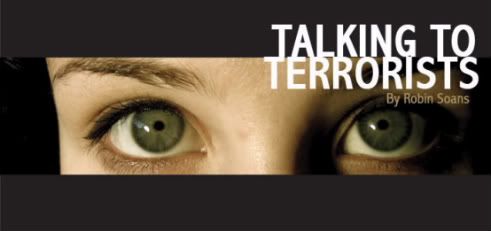
Written by Robin Soans
Directed by Mark Haslam
Assistant Director Emma Mcmanus
Verbatim theatre is a strange thing. To my mind it is the antithesis of what theatre aspires to, in that it (often under the guise of being objective) uses the words of real individuals or documents to present a kind of overview of a particular subject; a presentation of reality. To me, theatre is much more about an aesthetic and visceral engagement with the world than a summary of situations or people that exist in it. Surely that is the domain of the documentary and the nightly news, not the theatre. As Simon identified in Version 1.0’s Deeply Offensive and Utterly Untrue, objectivity in verbatim work is highly suspect. Simply by framing it as theatrical, the work loses any pretence to objectivity, seemingly undercutting itself. So in light of this, what is the deal? Why bother? What does it offer us?
Talking to Terrorists, in Mark Haslam’s hands, offers us a human connection. The performers relate this text directly to us, looking us in the eyes and sharing the experience with us; something a documentary or interview could never do. It is staged simply in a beige box and the performers are mostly static throughout their monologues and scenes, entering and exiting either from a door upstage or a second level staircase above it. It has no pretense to high aesthetic ideals, the focus is purely on the performers and their communication with us. To quote the program…“though the space, actors and production might all be built on artifice, the truth of the experience remains.”
And the truth of the experience is distressing. Talking to Terrorists is the product of 12 months of interviews with individuals involved with or having some experience of terrorism. In a broad sweep this covers child soldiers in Uganda, British politicians and ambassadors, members of the IRA and UVF, Palestinian Miltia, Kurdish separatists and aid workers. The complexities of the subject matter are done away with in favour of the emotional core of the experience, the consequence being that some of the most affecting moments are not driven by horror but by recognition: giving a face to something that is usually represented as faceless. It is the domestic insight as someone slops a cup of tea, accidently picks up the wrong wine glass or has a tiff with their partner that really brings terror home to us.
The nuances of the text are handled gracefully by the cast (my year); it is delightful to see a university production where every single performance is on the same level, since usually it is a bit of a mixed bag. It is incredibly exciting to see how they have progressed through this process and full credit to Haslam for bringing this out in them.
In relation to my own practice, Talking to Terrorists reminded me that theatre is a two way street, a shared experience and, while I am still wary of verbatim theatre, a beautiful way to be informed and learn.
Mark

